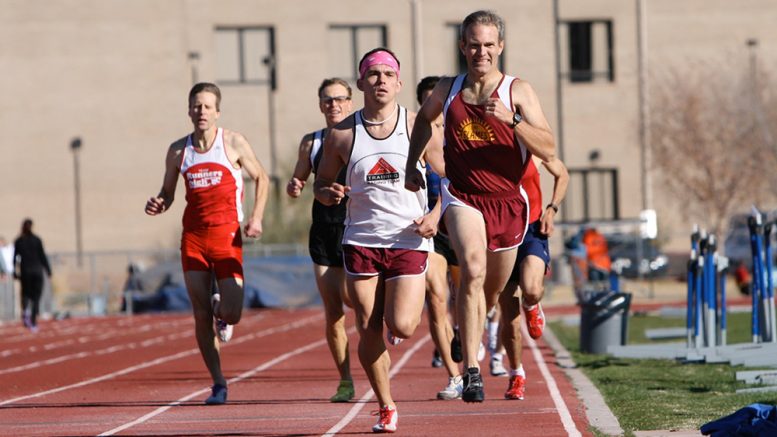By Douglas Thompson
Athletic performance breakthroughs are rare. For masters athletes, they may be even less common, since the athlete has already tried many approaches to improve their performance, and because time is constantly eroding what is possible.
I seem to be experiencing one of these rare breakthroughs. It’s exciting, but I’m still not sure it’s going to last, and that makes me nervous.
I am sharing my story in the hopes that some of you will share your own, and give me some perspective and insight into what may be happening.
Since I began running track at age 44, I have been consistently good but not great. I met the All-American standard in the 800 meters in my second year of competition, and naturally looked to improve from there.
Surely with some additional experience and effort, I thought, I would climb in the world rankings. But in spite of a serious approach and a lot of work, that never happened. Every year I met the All-American standard for the 800, but never cracked the world top 25.
Arguably my best year was 2014 – I placed fifth in the 800 at U.S. outdoor nationals, and my 800 time was eighth in the U.S. and 27th in the world. I was even 43rd in the world in the 400!
Then, beginning in 2015, I had a series of injuries, including plantar fasciitis, a sportsman’s hernia, hamstring pulls, a broken toe and finally two meniscus tears. My record from mastersrankings.com shows two mediocre 800 race times from 2015, and then nothing, until this year.
I tore my left meniscus (the lining of the knee joint) in early 2016, and didn’t realize what I’d done until later that year. All I knew is that it hurt to run more than a mile or two, and I couldn’t train seriously. I had surgery in November, and then, while rehabbing my left knee, tore my right meniscus in early 2017.
I was finally able to resume training in the summer of 2017 and, needless to say, I was really slow. I wasn’t sure I would ever be able to return to competitive track.
Due to my knee injury, I wasn’t able to run more than a few miles without my knees swelling and aching, but sprinting didn’t have the same effect. I was able to run all out without bothering my knees, and that’s what I did. It was a lot more fun to train as a sprinter instead of an 800 meter runner, and I made rapid progress.
By the end of 2017 I was running 13.5 in the 100, 27.8 in the 200, 62.6 in the 400 and 2:36 in the 800. Not great times, but I was confident that I would once again run competitively.
By spring 2018, I had exceeded all of my goals and expectations. By the end of April, I had run 12.85 in the 100, 26.5 in the 200 and 59.2 in the 400, but only 2:30 in the 800. My FAT race times were a little slower: 13.17 in the 100, 26.95 in the 200 and 59.82 in the 400.
To give some perspective on these times, I hadn’t run under 13 seconds for the 100 in 10 years. I had only run under 26.5 for the 200 meters once, in 2008 – 10 years ago. And my 2014 400 time, my fastest since 2009, was 59.7 – slower than what I am now running in practice.
In summary, I am now running faster in the 100, 200 and 400 meters than I have since 2009, although much slower than I ever have in my former specialty, the 800 meters. And here’s the part I’m really excited about: If I can just maintain my performance until October of this year, when I turn 60, I should finally crack the top 25 in the world rankings in the 100, the 200 AND the 400, and possibly the top 10 in the 400.
The question is: WHY am I faster now? The answer is: I don’t know. It could be because I always had more potential in these shorter races, but that my focus on the 800 meters kept me from training to my potential. It could also be that my three-year, injury-enforced break from competition has given me “fresh legs.”
Or that my unique genetics are causing me to lose speed more slowly than other people on the rankings list.
As I mentioned, I’m nervous. I’m months away from age 60, and I’m worried that I’m going to be injured, or fall ill before I get some official marks in the record.
Recently I’ve had a period of low energy that I believe was caused by dehydration, and then some heart flutters that concern me. I hope that I can continue to perform well, and even improve, long enough to enjoy the fruits of this breakthrough.
Have any of you experienced something similar? What was it like, and did the improvement last? Do you have any ideas about what could be going on and how to keep it going?
Welcome to Guest Essay, our latest feature. If you’d like to submit your own and reach thousands of people, write me at TrackCEO@aol.com and include a photo of yourself (preferably in competition). All essays are unpaid and subject to light editing.
Contribute to support independent track and field journalism:




Great job. Slowing maybe a second from age 50 to 60 in the 400 is indeed a slower than average decline. I truly think there is something to be said for taking regular breaks after age 50. The continual up and downs with nagging injury can take its toll and I think more than anything it has something to do with that. Probably not a bad idea to take at least one year off running every 5 years or so and focus on alternative forms of exercise.
It sounds like Douglas should have done the sprints all along. Can’t see that the time off for injuries would have helped.
Matt B’s idea of taking a year off every five years is interesting. It would not work for me but I am not training at the elite level and the stresses of training and competing are much greater for the top guys. Will be interesting to see what the elite athletes will say.
What kind of volume were you doing previously? You are clearly shifting from slower-twitch to faster twitch predominance, and if you were overtraining (or even doing normal 800 training), it may have been inhibiting your top-end speed. I suspect that I have done the same in the past, although I was always able to keep my 800 as better than my 400/200.
BTW I find that using WMA calculations is better than rankings for cross-year comparisons. Too much variance in year-to-year ranking values, especially in the top-25 or so rankings.
Thanks Bryan, I wasn’t doing a lot of distance for an 800 meter runner, but I did have 2-3 road days a week, and I also ran some road races. My workouts are now quite different, with no significant aerobic work – I do 2-3 mile recovery runs or get on the exercise bike for 20-30 minutes. So your idea makes sense – I am just training differently than before.
Are the WMA calculations the % of max figures where 80 is “national level” and 90 is “world level”?
In the 2 months since I wrote the piece above I’ve finished my outdoor season. My last race was a disappointment – 63 seconds for 400, but I had been sick and it was late evening on a very hot day. I think I fell off the end of my training cycle as well. Last week I ran a time trial in 61.0, so I think I am back on track. I am doing the Clyde Hart indoor season workouts right now, planning to peak in late October and early November after I turn 60.
Here is the WMA calculator:
http://www.howardgrubb.co.uk/athletics/wmalookup06.html
Your 100 and 200 score 88% and your 400 is 87%, so not only are you a sprinter, but your 100 is very robust in comparison to your 400. Even in my 40s when I ran 55 for 400, I would have been challenged to run 13.1 (never raced; had a 2:05 800 PR)
Your 400 will look better than your 100/200 on rankings because the short sprints are more competitive. In any case you seem to be on the right.
“on the right track” (some pun intended 🙂
Thanks Bryan, time will tell; meanwhile I’m enjoying the journey!
Here’s a quick update to my post:
I began the indoor track season with some ambitious goals: break 60 seconds in the 400 meters and run a top-10 time in the world, set the Arizona state record in the 400, and perhaps also run world competitive times in the 200. Now, half a year later, the season is winding down. This year’s track season has featured the most significant athletic accomplishments of my life.
I have largely met my goals: I ran 59.5 in an early season meet, was 2nd at indoor nationals, and set the 200 and 400 meter Arizona state records. In spite of these accomplishments, I find myself only partially satisfied with the year. I peaked during the indoor season and have stagnated since then. In the early months of the year I had a good, consistent workout schedule, but since then I have been traveling almost weekly for work and have been unable to put together a consistent 2-3 weeks of solid training on the track.
Progressing in fitness is all about placing increasing stress on the body and then being able to recover quickly enough to do another hard workout – and being on planes and in hotel rooms doesn’t allow that to happen. So I’ve been hanging onto the end of my outdoor speed cycle for about three months now, expecting to fall off at any time. That hasn’t happened – I’m doing just enough to maintain my fitness. Just enough to keep my hopes alive. But it’s frustrating because I can see how a good month of uninterrupted training would give me another second or more in the 400 meters. I don’t know if my 59.5 will be fast enough for a top 10 position in the world this year, but under 59 seconds would definitely do it. I would also like to run a state record in the 800 meters, but that will require a different sort of training for a couple of months.
The mental aspect of my training has been a revelation. I began the year highly motivated, but as I’ve met my initial goals and my times have leveled off it’s been harder to get up for my workouts. In some ways, meeting my goals has been very satisfying, but in other ways it hasn’t been as transformational as I had expected. I imagined that being a world-class competitor would give me a huge high, and while that has been true at times, the thrill has faded and will only be renewed by further accomplishments.
I’ve also pulled most of the obvious performance levers, including scientific training methods, nutrition, weight management, caffeination, mental practice, (legal) supplementation, etc. I’m doing almost everything I can think of that’s relatively easy and inexpensive – doing more will take a greater effort and/or more money – things like massage/physical therapy, professional coaching, etc.
Still, this year has been an amazing experience. I believe I can still go faster, if I can just train consistently. That may not happen until I retire in a few years, but I will keep at it!